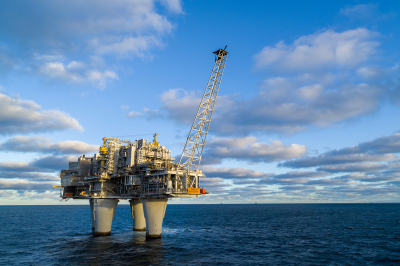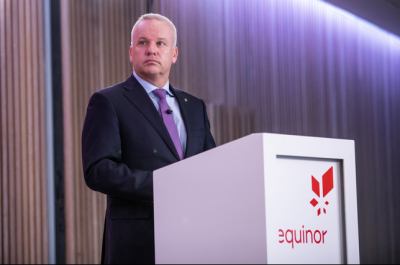Norway’s state oil company Equinor is almost drowning in cash after reporting its highest profits ever this week. Top management, though, is anguishing over what to do with all the money generated by a company that produces “politically incorrect” fossil fuels, while also facing the risk of repeating earlier mistakes and some unhappy employees.

Some might call it a “luxury problem:” profits so large that Equinor has an enormous cash flow and technically no debt. Shareholders, meanwhile, are about to receive extraordinary dividends and lucrative share buy-back offers. Newspaper Dagens Næringsliv (DN) referred to Equinor’s record-high operating result of NOK 132 billion (USD 15 billion) in the fourth quarter of last year as “extreme.” It’s 60 percent higher than even Equinor’s last record set in the third quarter of 2021.
Cash is literally pouring in, not least when converted into the Norwegian kroner that will also flow into state coffers. The Norwegian government still owns 67 percent of Equinor (formerly Statoil) and also stands to benefit greatly from the jobs created and taxes paid by the company, in addition to its own dividends from after-tax earnings of USD 10 billion for the year as a whole. That currently converts to nearly NOK 90 billion, enough to build dozens of new Munch Museums or Opera Houses.
Yet Equinor’s chief executive officer Anders Opedal is taking a cautious approach to the huge profits, generated mostly by extraordinarily high prices for natural gas. Oil prices have also soared recently, trading at more than USD 90 a barrel this week. When they crashed during the early months of the Corona crisis in 2020, the then-new CEO Opedal had to report Equinor’s worst profits ever. Just a year later, the situation has changed entirely.
Now, reports DN, Opedal doesn’t want to repeat Statoil/Equinor’s earlier mistakes of investing in new projects when prices are high. Opedal is acutely aware of the cycles in the industry, and he refused to be triumphant on Wednesday when Equinor announced both its huge profits and a strategy update (external link to the company’s own earnings report).

“Many times, when prices have been high, the industry has stepped on the gas,” Opedal told DN after the company’s formal presentation of 2021 results. “That’s led to (investment) projects that looked good but didn’t necessarily end up good.” He doesn’t want to repeat mistakes like when the former Statoil invested heavily in land-based oil projects in the US and controversial tar sands in Canada that went very badly. The company where he’s worked for years ended up being publicly embarrassed after losing more than NOK 200 billion in North America, based on the idea that oil prices would remain at more than USD 100 a barrel. They ended up collapsing. Equinor has since sold off some of its troubled projects in North America. Ongoing operations turned profitable after oil prices rose, but the experience left some lasting scars.
Opedal is thus adopting a “better safe than sorry” strategy that will keep investments at around USD 10 billion a year and postpone a rise to USD 12 billion a year until as late as 2025. The biggest challenge right now is finding suitable investment projects with good prospects, especially in the area of renewable energy. Equinor is under pressure to speed up the company’s diversification into renewables like offshore wind projects, but such projects with strong prospects for profits are few and far between.
Caught in a squeeze
“They don’t dare increase investments in more oil and gas because that’s not politically correct,” John Olaisen, an analyst for ABG Sundal Collier, told DN, “and there’s long lead time on wind projects.” They won’t start paying off for years, even though the Norwegian government finally launched a licensing round for wind energy projects in the North Sea just hours after Equinor announced its huge profits.
Earnings from what the Norwegians call havvind (wind turbines at sea) also hinge on cables that could sell the wind-generated electricity abroad, instead of just sending it back to Norway, or on hybrid cables that would allow both. The first new government projects will only have cables to send the power back to the Norwegian mainland, in order to add to Norway’s own energy supply and, hopefully, lower monthly electricity bills that have soared in recent months.
The bottom line is that climate-friendly and politically correct renewable energy projects won’t be nearly as profitable as oil and gas still is. One alternative, notes Olaisen, is for Equinor to acquire existing wind energy companies, with the Norwegian firm Scatec often mentioned. Equinor already holds a minority stake in it and could just take it over, but Olaisen thinks it’s good that Opedal is holding off on making any major moves just yet. Other analysts and commentators in Norway seemed to agree with Opedal’s display of “capital discipline” and transferring much of the company’s free cash flow to its owners.
Lots of other challenges, too
Another reason for Opedal not to be wildly celebrating Equinor’s huge profits is that they’ve come as a result of the energy crisis that’s causing huge problems and expense for consumers both at home and abroad. Hard-pressed customers in Europe, where most of Norway’s gas is exported, have had to pay the record high gas prices also because of tensions with Russia and the threat of war. Oslo newspaper Dagsavisen editorialized on Thursday that “we’re ensuring our own affluence and welfare with products (oil and gas) that threaten the future, and we grow rich on a Europe on the verge of war.”
Equinor’s profits thus have a downside, and Opedal also has faced lots of other challenges in the past year. The company has been criticized over deficient safety standards at some facilities, and its Melkøya gas processing facility in Hammerfest has been closed since a major fire in September 2020. Its reopening was recently postponed until mid-May, meaning it’s missed out on the historic prices for its gas.
Equinor has also been accused of making its emissions cuts look better than they really are, not least because neither the company nor Norway itself has to account for emissions from all the oil and gas that’s sold, exported and used elsewhere. Newspaper Klassekampen reported last month how Norway plans to cut its emissions by 27 tons before 2030, while the emissions attached to all its exported fossil fuel annually amounts to 449 million tons. Equinor can boast about how it’s cutting emissions from its offshore platforms and mainland facilities, but doesn’t have to take responsibility for emissions from its products. Even though Equinor intends to cut its oil production in half by 2050 and make it emission-free, it’s moving forward with more oil exploration in Norwegian territory, in part thanks to much-debated financial incentives offered by the Norwegian government during the Corona crisis.
Unhappy employees
In the middle of all this, Opedal and his new management team at Equinor have struggled to win the confidence of Equinor employees, who’ve been subjected to a major reorganization that’s been unpopular at best. DN reported in December how employee surveys revealed a level of confidence in top management that even the company itself characterized as low.
Called the “Global People Survey,” it suggested that employees were uncomfortable with the level of changes being made within Equinor, that employees felt didn’t feel encouraged to seek career opportunities within the organization, that they had little confidence in top management and that they didn’t always feel their own managers allowed them carry out their work in the most effective manner.
The survey was conducted last September, just months after a controversial reorganization of the company was completed. One result of the reorganization that was particularly unpopular was the rise of so-called “competence centers” that turned several thousand Equinor employees into a form of internal consultants who could be “lent out” for various assignments within the company. That created unrest and dissatisfaction.
A company spokesperson told DN that the survey results “created an important foundation for improvement within the entire organization.” She promised the “feedback” provided by the employees through the survey would be followed up “internally in the various teams at all levels in the company.”
Bosses reporting to new bosses, too
Since January 1, Equinor’s top management is also reporting to new representatives of the company’s major owner, the Norwegian government. Statoil/Equinor had always had its regularly scheduled “owner meetings” with the government’s Oil & Energy Ministry, but now Equinor will deal with the ministry in charge of business and the fishing industry. Oil policy will remain with the oil ministry, including licensing for new oil fields, but ownership policy (including how much the state may meddle as a major owner in the companies in which the state holds large investment stakes) will now be handled by what amounts to Norway’s trade ministry or department of commerce.
The change was made by the former Conservatives government, which found it problematic that the same ministry that dealt out exploration licenses to all oil companies was also the largest single owner in the company that’s the largest operator on the Norwegian Continental Shelf. It was also deemed best to assemble all the state’s business ownership dealings in one ministry. The government also has large stakes in major Norwegian companies Telenor, Yara, Norsk Hydro and Den norske Bank (DNB).
New Trade Minister Jan Christian Vestre of the Labour Party will thus be the minister to whom Opedal and his team report on various issues. The Norwegian government has traditionally maintained a hands-off strategy regarding management, but that’s come under fire in connection with environmental concerns or when companies venture into countries where they’ve run into trouble. That’s happened to Statoil/Equinor in Angola, the US and Algeria, for example, to Yara in Libya and to Telenor in Myanmar.
Political commentator Frithjof Jacobsen wrote in DN last summer that the new Labour-Center government may turn the trade ministry into “command central” for stronger state steering of Norwegian industry. New minister Vestre has since claimed there will be no major changes. Asked whether he’ll become a more active representative of Equinor’s major owner, Vestre told newspaper Aftenposten last month “no, we will of course follow up the companies through a tight and good dialogue with them” but added that the separate roles of management responsibility and the board of directors’ responsibility will remain firm.
The new government’s platform, though, promotes “active ownership” and cites a need for national control and contributions to more climate-friendly business. A new report on the government’s role in companies is due later this year.
newsinenglish.no/Nina Berglund

